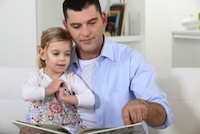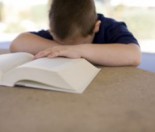When our children come home from school with school readers as homework we can feel a huge responsibility to ‘help in the right way’. Often this can be difficult because we may not know what the right way is.
Some schools are wonderfully proactive where school readers are concerned and will hold information evenings for parents at the beginning of the school year designed to explain strategies to parents how they can best help with their children’s reading.
Sometimes it is up to us as parents to seek that information in order to understand how we can help. We don’t want to do too much, we don’t want to do too little. We can be concerned that they are relying too heavily on the pictures that accompany the story. We sometimes don’t understand the repetitive nature of the books.
The best person to give you advice on strategies how best to help your child is their teacher. This article is designed to give you some generic, practical advice about how reading homework works best but each child is different.
How to help with reading homework
Concentrate on reading for meaning rather than reading for accuracy
Remember that reading for meaning is the most important part of the process. A child who can read pages fluently but who cannot tell you what they have read will gain nothing from it. On average a child needs to encounter a word 14 times before they begin to recognise and be able to read it fluently within a sentence. It is more important that they know what has happened in the text than that they read every word with accuracy. That will come.
Keep reading time relaxed, comfortable and pleasurable, in a quiet corner, with the television turned off.
A child who feels they are going to told off is not going to feel comfortable reading with you. Getting frustrated with them will do neither of you any good and reading time will become a chore noone enjoys. Make them want to read with you again. Don’t sweat the small stuff.
Before you begin reading the book talk about the cover and read the title.
Ask some question about it like : what do you think it will be about; what sort of book is it; have you read one like this before?
Guessing/predicting what the story may be about can sometimes help with understanding what they find out when they read the book. It can also develop a wee bit of excitement about whether their prediction may be right.
Look through the book, note any interesting pictures and words, then read the opening together.
Be patient
Don’t correct too quickly. If your child makes an error suggest having another go, searching the pictures for a clue, sounding out the first letter or reading on before you ‘tell’ the problem word.
This is a really good reason why reading shouldn’t be rushed and you need to allot it plenty of time. Wait for your child to have a couple of goes at getting the word right. Don’t be afraid of there being silence and let them use the pictures for clues.
If your child is really struggling, take over the reading yourself and let the teacher know.
Some other ideas –
When your child brings home a book that has been read before ask for a summary before reading it again, then discuss the book at a deeper level than last time.
As your child progresses, talk about authors, characters and plots or what new information has been learned.
If your child reads silently ask her to re-tell the part that has been read and encourage the ‘pointing out’ of relevant sections in the text.
Attend information sessions about reading run by the school and read any guidance that is sent home.
Check out our glossary for explanation of reading terms. We also have some great article about how to help boys with reading and reading activities.






